#series: hijikata haiku
Explore tagged Tumblr posts
Text
Hijikata Toshizo’s haiku poems
Here’s a list of all 41 of Hijikata’s haiku poems from his book “Hogyoku Haiku Collection” (豊玉発句集), along with translations for each one.
The translations are based on japanese-wiki-corpus (English), fushigi-dono (Russian), WhiteWind (Japanese explanations) and shinsengumi.forumvi (Vietnamese). I tried to focus on the intended meaning rather than the literal translation.
Overall, he really liked to write about spring, plum blossoms, snow and kites 😅
Which one’s your favorite?
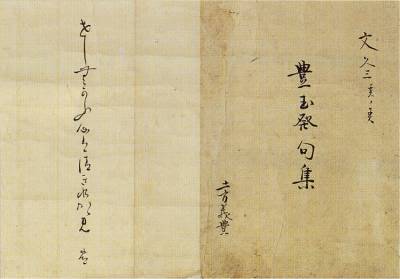
(Image from fushigi-dono)
文久三 亥の春 豊玉 発句 集 土方義豊 Bunkyu 3, Spring of the Year of the Boar Hogyoku Haiku Collection Hijikata Yoshitoyo (commentary)
さしむかふ心は清き水かゞみ My heart is pure as I face my reflection in the water (commentary)

(Image from fushigi-dono)
裏表なきは君子の扇かな A gentleman’s fan has no front or back (commentary)
水音に添えてききけり川千鳥 The cries of river gulls— accompanied by the sound of water (commentary)
手のひらを硯にやせん春の山 Mountains in spring— I use my palm as an inkstone (commentary)
白牡丹月夜月夜に染めてほし White peony, on a moonlit night— hoping to be dyed in moonlight (commentary)
願うことあるかも知らす火取虫 Moths, full of desire, are taken by the flames (commentary)
露のふる先にのほるや稲の花 Dewdrops fall from the tips of rice blossoms (commentary)
おもしろき夜着の列や今朝の雪 In front of the snow this morning, lined up in their night kimonos— How funny! (commentary)
菜の花のすたれに登��朝日かな The rising sun shines through the bamboo curtain— of canola flowers (commentary)
知れば迷いしなければ迷わぬ恋の道 The ways of love, if you know it, you are lost, if you know it not, you will not get lost (commentary)
知れば迷いしらねば迷ふ法の道 The ways of law, if you know it, you will get lost, if you know it not, you will still get lost (commentary)
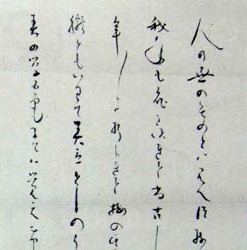
(Image from fushigi-dono)
人の世のものとは見えず梅の花 Plum blossoms do not appear to belong in this mortal world (commentary)
我年も花に咲れて尚古し Every time the cherry blossoms bloom, I grow a year older (commentary)
年どしにおられて梅のすがた哉 Year after year, this crooked plum tree continues to bloom (commentary)
朧ともいはて春立つ年の内 How confusing, the first day of spring has arrived before the first day of the year (commentary)
春の草五色までは覚えけり The herbs of spring— I’ll remember only five alternative: 春の鶯五色までは覚えけり (source) The bush warbler in spring has learned to sing five notes (commentary)
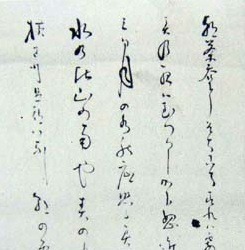
(Image from fushigi-dono)
朝茶呑てそちこちすれば霞けり Steam from my morning tea, here and there, merges with the haze of dawn (commentary)
春の夜はむつかしからぬ噺かな On a spring night, we were engrossed in carefree conversation (commentary)
三日月の水の底照る春の雨 The crescent moon shines from underwater— spring rain (commentary)
水の北山の南や春の月 North of the waters, south of the mountains, is the spring moon (commentary)
横に行き足跡はなし朝の雪 In the morning snow, there are no footprints off the beaten path (commentary)

(Image from fushigi-dono)
山門を見こして見ゆる春の月 Looking beyond the temple gate— the spring moon (commentary)
大切な雪は解けけり松の庭 In the pine garden, my precious snow has already melted (commentary)
二三輪はつ花たけはとりはやす The first two or three blossoms cause so much celebration (commentary)
玉川に鮎つり来るやひかんかな In the Tama River, the ayu fish are coming, but it’s the Day of Mercy (commentary)
春雨や客を返して客に行 Spring rain— parting ways from a guest, I visit another (commentary)
来た人にもらひあくひや春の雨 A guest arrived and made me yawn— spring rain (commentary)
咲ふりに寒けは見へず梅の花 The plum blossoms do not look cold in bloom (commentary)
朝雪の盛りを知らす伝馬町 In the Tenma district, no one knows the beauty of morning snow (commentary)
丘に居て呑のもけふの(飲むのも今日の)花見かな I wonder if I'll be up on the hill drinking or just viewing the cherry blossoms today (commentary)
梅の花 一輪咲いても 梅は梅 A plum blossom, even if it’s only one, a plum blossom is a plum blossom (commentary)
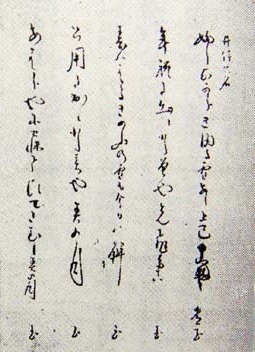
(Image from fushigi-dono)
(井伊公君)ふりなからきゆる雪あり上巳こそ (Lord Ii) The snow that fell on the third of the third month has already melted (commentary)
年礼に出て行空やとんひたこ On the way to say my New Year's greetings, a kite flies in the sky above (commentary)
春ははるきのふの雪も今日は解 Spring is spring, and the snow that fell yesterday is melting today (commentary)
公用に出て行みちや春の月 I can see the spring moon on my way to official business (commentary)
あはら屋に寝て居てさむし春の月 It’s cold sleeping in this shabby house, the spring moon shines above (commentary)

(Image from fushigi-dono)
暖かなかき根のそはやあぐるたこ (ひか登り) In the warm air, next to a fence, a kite rises (commentary)
今日もきょうたこのうなりや夕けせん Today again and again, you could hear the buzzing of kites, until dinner was over (commentary)
うぐいすやはたきの音もついやめる A bush warbler sings, I look up from my cleaning (commentary)
武蔵野やつよふ出て来る花見酒 Go to the fields of Musashi, and get drunk admiring cherry blossoms (commentary)
梅の花咲る日だけにさいて散 Plum blossoms bloom and scatter on the same day (commentary)
Sources:
English translations: https://www.japanese-wiki-corpus.org/person/Toshizo%20HIJIKATA.html
Photos + Russian translations + commentary: https://diary.ru/~fushigi-dono/?tag=5054930&n=t
Russian translations: https://morreth.livejournal.com/1280012.html
Photos + Vietnamese translations: https://shinsengumi.forumvi.com/t23-topic
Photos: http://www.toshizo.com/takara/toshi020.html
Photo: https://intojapanwaraku.com/editorgo/171083/
Art + Commentary: https://earlgreyimperial.bufsiz.jp/hijikata/tosizou000.htm
Commentary: https://detail.chiebukuro.yahoo.co.jp/qa/question_detail/q1418506134
Commentary: https://ameblo.jp/rekijyo-doumei/entry-11511616596.html
#poem#Hijikata#translated#translated from Japanese#list#recommended#series: hijikata haiku#hijikata poem
84 notes
·
View notes
Text
Hakuoki Ramblings (Part 2.5?)
hello. so i wanted to do a sorta character analysis thing (it's probably gonna read out more like a 'reasons why i love X and they have a place in my brain) and so i decided to do a seperate, spe-shal post for this. and who better than mah boi okita?
from the moment he first appeared on my screen and said those infamous first lines, he took away my breath (and my sanity, and the top spot on my ultimate husbando list. but i digress). even now, my love for okita is strong as always (even iba isn't enough, like he's great and all, but i feel like i like him because of the potential he had as opposed to his actual character).
the other okita souji I've seen (who is also based on the real life figure, albeit loosely) is the Okita Sougo of Gintama. in the show (which is hard to slug through but it's pre good, i'd recommend to watch), okita is seen as a sadistic swordsman who has his insane moments and a rivalry with hijikata, the "demonic vice-commander". the reason why i note this is because there are quite a lot of similarities between the two.
the thing with hijikata-> throughout both series, okita pokes fun at hijikata. in hakuoki, this manifests in the form of banter whereas in gintama, the "poking fun" is brought up to a whole 'nother level as okita (repeatedly, and unsuccessfully) tries to kill hijikata. either way, it provides a form of entertainment and in the case of hakuoki , provides some lightheartedness to the gravity of the game (can't say for the anime, cuz i haven't watched it). favourite, memorable, moments include:
the ishida medicinal powder thing
THE HAIKUS
when okita points out that chizuru was assigned to be an attendent to hijikata and okita is told to shut it (memory is a little iffy on that part, it was chapter 1-something)
(still can't format the fooking thing, i lied, i can't do it but this is numero 2) the sadistic side. in the game, okita's sadistic side is not so much sadistic in verbal terms as it is just bloodthirsty, self-depravating (in some instances) comments. same with his killing style, i feel (note: has been a very very long while since i completed this man's route so could be inaccurate) that he's not the sorta person that would slowly torture and kill someone (unless pushed over the edge which he is pre close to, admittedly) but rather would go with one slice/stab and get high in the rush of life.
the light brown hair (apologies, i forgot most of my arguments because I'm coming back to this after weeks. was supposed to end the year with this and now its march. )
snarky comments. a lot of snarky comments.
(oh god i want to play hakuoki again, it's been too long. but life. but hot anime men. will get back to this one.) here are just some hakuoki specific ones.
abs. (ik a lot of characters have shirtless cgs. i haven't seen okita's yet so i can't say ive seen them per se but he's a hot anime warrior dude- he has some)
the fact that he based his hairstyle on kondou (KYAAAA)
this is long enough as is tbh, and my brain hurts from too much science. but hey, i am able to proclaim my love for a psychotic-warrior-dude-based-on-a-now-dead-guy which kinda weirded me out when i first thought of it this way because then the question remains, do i simp for a dead guy or a reinterpretation of him? in that case, could i say that i am truly a devotee for the mans? (at the same time, i know people simp over irl serial criminals and george michael)
in the end, i will not pull a nick gatsby and wait for a long time for what was simply attraction to ideals to be reciprocated at all. although i suppose i am less pitiful, in that i am aware that it will never happen. now please excuse me as i still continue to stare into that green light and bask in the temporary happiness it may provide me
#hakuoki ramblings#i figured why not make this a tag#hakuoki#okita souji#i started uni#i love it but god do i hate physics#why did i take physics#i need to do my lit readings#lit is fun#may update more often idk idk
5 notes
·
View notes
Text
IkeSeries Masterlist
IKEREV
Bad poetry
Release haiku Card gacha haiku Edgar Chutney Fenrir’s route haiku
Fanfiction
Earplugs Broken Blood (Fenrir, angst, death) Rain and Cocoa (Luka, fluff: creator gacha) Long Live the Ace (Ray, Fenrir, angst) Pets series Betrayal (Fenrir, Shushu, angst, tw: euthanasia)
Fanart
Seth: Seth of the Crystal, birthday drawing, Seth in drag Fenrir - Ruff!, birthday drawing Luka/Edgar/MC sleeping FenRay sandwich (fanservicey) Sirius - wolf, birthday drawing Lancelot - birthday drawing Loki - birthday drawing Oliver - birthday drawing Zero: portrait, fanservice, graphite drawing, windy Kyle - birthday drawing Edgar - birthday drawing Luka - Rain and Cocoa (creator gacha), birthday drawing
IKEVAMP
Fanfiction
Call His Name (Le Comte, drabble, silly) The Most Effective Pick-up Line (Vlad, drabble, punny) Insulted (Shakespeare, drabble, silly) Invite (Leonardo, drabble, punny) Theo’s Nights (Theo, miniature, angst) The Butler’s Presence (Sebastian, miniature, mournfic) Pets series Leonardo’s Cat (Leonardo, Lumiere, deathfic) Feral is a Wolf’s Fate (Theo, male OC; werewolves) Part I | Fate End | Hollow End | Bitter End
Fanart
Jean: fem!Jean - portrait, birthday drawing Sparkling vampires: Mozart, Shakespeare, Le Comte Napoleon: Sleepy with Napoleon, birthday drawing Mozart: birthday drawing Vincent: birthday drawing Dazai: birthday drawing Sebastian: birthday drawing Arthur: in drag, birthday drawing Leonardo: birthday drawing Theo: birthday drawing IkeVamp pigtails part 1 Prologue revised
Midnight Cinderella
Alyn & Leo - birthday drawing Rayvis - birthday drawing Nico - birthday drawing
Destined to Love
Sakamoto - birthday drawing Saito - birthday drawing Hijikata - birthday drawing Yamazaki - birthday drawing Kyo - birthday drawing Haru Akira - birthday drawing Okita - birthday drawing Takasugi - birthday drawing
Love Lies and Heist
Logan Bradley - birthday drawing Ewan Bradley - birthday drawing
5 notes
·
View notes
Text
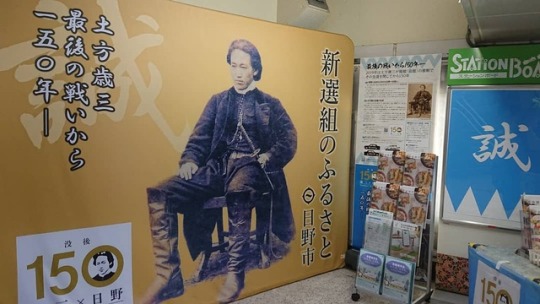




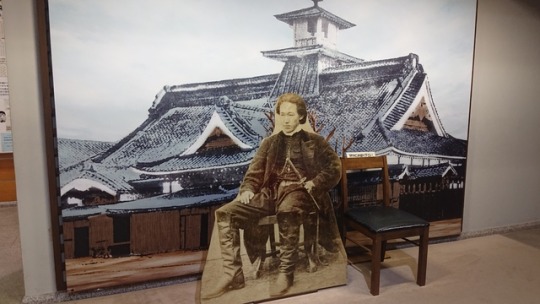

Yesterday I was in Hino!!!!!!
I was the for a Peacemaker Kurogane event, where the voice actors of Tetsu (both VA of his younger and older self were there), Tatsu, Susumu, Saitou, Hijikata, Kondo and the three idiots.
It was a great event, they preformed scripts of the CD drama that came with the first movie DVD and spoke about the shinsengumi and PMK (or as it's known in short in Japan: Pisume).
The VA of Shinpachi and Sano both wore kimono, matching what their character wear (Yamaguchi-san looked just like Shinpachi!!!!!!). He said it was all planned, and Santo's VA agreed... Then Heisuke's VA chimed in going "this is the first I heard of it". Those three were great tbh. XD
Soujis VA is a sweet heart, and Saitou VA was amazing.... At the introductions, he began talking like he would as Saitou, then broke character by giving out a hearty laugh. Hahaha
Anyway, other from the event (no photos were allowed during the event). I also met other fans of the series - I was the only foreigner, but everyone made me feel so welcome. They approached me! Haha
I also went to the Shinsengumi museum and Hijikata museum. Where, at the Hijikata museum, got the rare chance to see his sword! I got to see Kanesada!!I also got to see his haiku books and in the Shinsengumi museum, they have the original copy of Hijikata's photo... It was truly special.
It was a great Sunday, and a quick 24hr trip to Tokyo and back. We're all thinking that they're planning something too, because this PMK event was called "spring gsthering". So we're wondering if they will, in the future, will do one for each season. Especially since the voice actors have been saying on sns thst they really enjoyed the event, and were so happy to see so many of us.
38 notes
·
View notes
Photo
This book is also very informative
The duo behind the popular "English words that won't appear on the exam" series will now teach you "Japanese history that won't appear on the exam"! Historical gag book "Nakayama's Japanese History C"! Now's the time to promote Japanese people! It's full of fun Japanese history trivia that won't appear on the exam, but will be fun! * This book is a historical comedy based on people and events in Japanese history. As the title suggests, this is a type of book that is not useful for studying for exams, but rather useless. (from: Amazon.jp)
Here are the pages related to the Shinsengumi with translations:

Hijikata Toshizo looks terrible like this.
Hijikata Toshizo
"Civilian clothes are lame."
Trivia
Hijikata was feared as the Demon Vice-Commander of the Shinsengumi, but because he was a very handsome man, he was very popular among women back then and still is today.
There's a famous anecdote in which he proudly sent a love letter he received from a woman to his distant relative Kojima Shikanosuke in his hometown of Tama. This is a piece of dark history.

Buy one get one 50% off
Kondo Isami
(1834-1868)
"Kondo's Kotetsu, probably a forgery"
Trivia
Kondo Isami's Kotetsu sword, known for the phrase "Kotetsu is thirsty for blood tonight", was likely to be a forgery, unfortunately.
There are various theories, but firstly, the Kotetsu was a very expensive item that only feudal lords could afford. Also, it's hard to imagine it being owned by someone who was funny enough to pull off a trick like putting his entire fist in his mouth at drinking parties.

There might be enemies.
You might be attacked by birds.
Shinsengumi
(1863-1869)
"Defensive patrolling" [T/N: wordplay on "defensive driving"]
Trivia
The Shinsengumi, like schools today, had instructors for each subject, such as swordsmanship, jujutsu, literature, artillery, horsemanship, and spearmanship. "Literature" seems to be the only subject that stands out from the others, but it's said that there was a literature teacher who taught it.
Hijikata Toshizo was fond of waka and haikai poetry, and left behind a collection of haiku titled the "Hogyoku Haiku Collection". However, I can't say he was a good poet.

HittoriーSurround and slash the enemy! ♪
HittoriーSurround and slash the enemy! ♪
We didn't kill Sakamoto Ryoma! ♪
* refrain
Don't break the Shinsengumi Code! ♪
* refrain
[T/N: I have no idea which song they're parodying 😅]
Shinsengumi
(1863-1869)
"Military cadence"
Trivia
A military cadence is a marching song sung by the military during training.
In Japan, the hymn of the US Marine Corps is popular [T/N: It was used as background music for a horseracing information broadcast for over 40 years 😅]. Incidentally, although the Shinsengumi had a strong ferocious image, their policing was focused on arrests.
Although they were a group of swordsmen, they avoided engaging in one-on-one duels, but rather surrounded one enemy with two or three men and hunted him down. Thus, the Shinsengumi was a police organization, not a military force, which naturally means they didn't have a marching song.

Shinsengumi Stopover [T/N: wordplay on "police stopover"]
Shinsengumi
(1863-1869)
"The Sonno Joui repellent sign"
The Shinsengumi's daily routine consisted of patrols twice a day, daytime and nighttime.
A group of about 13 members, including one captain and two lieutenants, made rounds in the city of Kyoto.
In addition, there were also undercover patrols, which were conducted by troopers in disguise and were very similar to those of today's police.
[CW: Below the cut are pages about seppuku]

Seppuku
"Be prepared to get to the point"
Trivia
Like sushi and tempura, "harakiri = seppuku" is world famous. In contrast to beheading, seppuku is considered an honorary punishment, as it's described as "giving a person permission to commit seppuku". The term for "seppuku" also changes depending on the motive, such as "oibara" (when a person dies as a martyr after their lord) or "tsumebara" (when a person takes responsibility for their failure).

Please raise your hand if it hurts~
Seppuku
"The second who cuts off the criminal's head on his signal"
Trivia
There were some extreme examples of seppuku, such as the Sanmonji method (three cuts to the stomach) performed by Takechi Hanpeita, but in the latter part of the Edo period, there were also many ritualistic methods such as using a fan as a dagger to give the signal to cut off the head without actually slicing the abdomen. A samurai's sentiment, isn't it?

Seppuku
"I stopped 1/8th of the way through, so I'm safe."
Trivia
Seppuku is about having another stomach for food. I don't know what that means.
----
If you can't use Amazon.jp, the book is available at: www dot pdfdrive dot com/出ない順-中山の日本史c-nakayamas-japanese-history-c-d201539934.html

Laughing my liver off because of this book. It`s called 「出ない順 中山の日本史C」 (Photo is not mine though, found on japanese twitter) Don`t be lazy and google for it - won`t be disappointed. The text under Hijikata is as follows: 私服がダサい。 Ordinary civil clothes are tacky. こんな土方歳三は嫌だ Such a Hijikata Toshizou is nasty .
64 notes
·
View notes
Text
Cherry blossoms = Mayfly
I was reading about Maquia on TV tropes, when I came over “Never Trust a Title” on the list, explaining how Maquia and Anohana had nothing to do with flowers despite it being in the title. I feel this sentiment is due to the Western audience not understanding the symbolism of flowers in Japanese and Asian culture.
Flowers - especially the cherry blossom (sakura) - is a common symbol for people whose lives have had a great impact / influence on others despite dying young, aka their short lifespan. It’s often described as a “bold beauty that only lasts a moment”. Another symbol for this is fireworks, or hanabi in Japanese, which literally means “fire flower”.
Therefore, “flower” fits both series, as it’s the Japanese’s symbol for the Mayfly-December Friendship trope. In Maquia it refers to the short lifespan of Ariel & co. in comparison to the long lived Iorph, and in Anohana it refers to the life of Menma who died young, but who had a big impact on her group of friends as they grew into teenagers.
Other places where this flower symbolism also appears is in Hakuoki where Hijikata is described as “You’re like the cherry blossom, the way you rush through life” (2:26). The Shinsengumi is also often compared to flowers as they rose to prominence, as commoners pursuing an ideal / vision of the way of the samurai, only to soon die out with the changing times.
youtube
Chinese series Bu Bu Jing Xin is another series that touches this mayfly theme. While watching the fireworks during New Years, the protagonist Ruo Xi expresses that she’d rather live boldly and short as a free spirit - as a vibrant firework - than surviving until old age while being trapped in the Forbidden City.
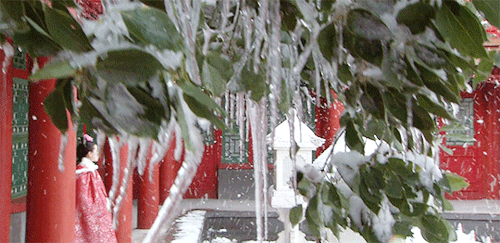
“Like many people that grew up in Japan, the cherry blossoms bring up many good memories as well as bittersweet ones to me. The cherry blossoms are very important to Japanese people as many celebrations and festivals take place during the blooming season. This very short blooming period is often compared to the transition nature of life. It reminds us that every beginning has an end and that life is beautiful yet very short.” (Source: https://blog.gaijinpot.com/significance-of-the-cherry-blossoms-in-japan/.)
The way seasons are expressed in general (blooming, ciscada, falling leaves, snow) is common throughout Japanese culture, and is a huge part of writing Haiku poems.
0 notes
Quote
In front of the snow this morning, lined up in their night kimonos— How funny!
Hijikata Toshizo
Original: おもしろき夜着の列や今朝の雪
Read all of Hijikata’s haiku poems here: https://shinsengumi-archives.tumblr.com/post/683071924948058112/hijikata-toshizos-haiku-poems
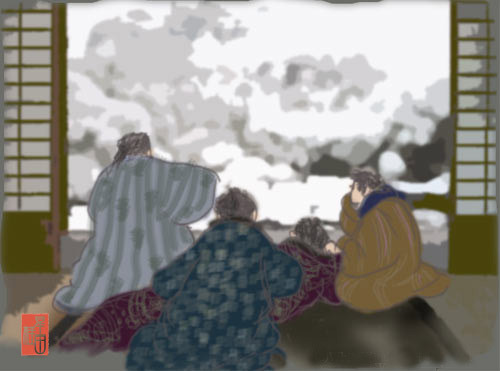
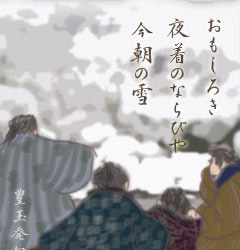
image source: WhiteWind歴史館
fushigi-dono:
Everyone probably knows about padded kimonos. During the cold season they used to cover themselves with them like a blanket at night. It was very convenient if you went to the toilet or somewhere else - put a blanket over yourself and go :)


Hijikata said, verbatim: "Funny - a row of night kimonos (and) the morning snow. That is, he does not say whether they are hanging, standing, or lying. So one can imagine that the laundry was drying and it got covered in snow, or that people in the morning in these same night kimonos came running to look at the first snow. The second version seems more plausible, because both kimonos and futons were hung out to dry in sunny, dry weather, and it is unlikely that anyone would have left them outside overnight in winter. That's unforgivable sloppiness So Hoshida-san suggests that this is a haiku about a winter morning at the Shieikan dojo. The future Shinsengumi leaders, dashing swordsmen, gathered in a row to admire the snow, all wearing blankets. That's funny :) I love this poem!
WhiteWind歴史館:
In front of the morning snow The sight of them lined up in their night kimonos (with their clothes on) Is interesting.
A "night kimono" is a kind of quilt in the shape of a kimono filled with cotton.
This is probably a scene from a winter morning at Kondo Isami's Shieikan Dojo, where Toshizo and the others were "staying". Future Shinsengumi leaders such as Okita Soji, Yamanami Keisuke, and Harada Sanosuke were looking out at the snow falling in the garden.
It was cold, so they were all lined up wrapped in their large "night kimono”. No matter what kind of swordsmen they were, cold is cold. Seeing such a funny appearance of his friends, Toshizo unintentionally captured the scene as a snapshot in haiku.
Incidentally, Toshizo also loved snow. Some haiku that show this side of him will appear later in the book.
#poem#quote#hijikata quote#translated#translated from Japanese#Hijikata#fushigidono#series: hijikata haiku#hijikata poem
39 notes
·
View notes
Quote
Plum blossoms bloom and scatter on the same day
Hijikata Toshizo
Original: 梅の花咲る日だけにさいて散
Read all of Hijikata’s haiku poems here: https://shinsengumi-archives.tumblr.com/post/683071924948058112/hijikata-toshizos-haiku-poems


image source: WhiteWind歴史館
fushigi-dono:
The last haiku in this collection. Sad, like the ones about moths or melting snow...
I think it's no coincidence that it's written at the very end. It encapsulates the "path of the samurai" that Hijikata embarked on with a pure heart, as he wrote in the first haiku. Leaving for Kyoto and leaving this collection at home, he was already ready to "blossom and scatter”, putting all his energy into that blossom. Because plums, you know how they are!
We learned a lot of things about him from this poetry collection. How he lived, what he admired, what he paid attention to... What he was like before he became Demon Vice-Commander. Although I think that even after Hijikata became Demon Vice-Commander, a lot of things about him remained the same.
So I'd like to finish with a poem that I think reflects the meaning of this whole collection. Author: just Vera:
Remember me not as a hero - I was not; but the era has commanded me To fly forward, into the bloody twilight of battle, And spurs, like a horse, thrust into me. I counted no victories or losses: There was no point in counting, When, at the end, gains and losses are reconciled Death is a swift and severe account-keeper. I shall return to you with autumn leaves, The rustling wind, the thin ice on the rivers... Remember me not as a hero. Remember me as a man.
Written by ginnan

WhiteWind歴史館:
Plum blossoms bloom and fall on the day they bloom
This phrase is written at the end of the collection of haiku. Condensing his way of life as a samurai into these 17 characters, Toshizo left for Kyoto, the place of his destiny.
He wanted to bloom to the fullest even if it was short, and to be graceful even in death... This phrase seems to crystallize the way of life of Toshizo, who fought until the very end of the Boshin War and then scattered.
Toshizo must have continued to write haiku after compiling this collection of haiku. Some of them must have been lost or destroyed during war.
In Kyoto, Aizu, Hakodate...
There is no way to know what kind of scenes and what kind of words he wrote about.
However, we can say that there is a lot of room for imagination for those of us who are as much "romantics" as Toshizo, and we can wonder what else he would have written.
(End)
--------
And that’s the end of the daily Hijikata poetry!
#poem#quote#hijikata quote#Hijikata#translated#translated from Japanese#fushigidono#series: hijikata haiku#hijikata poem
24 notes
·
View notes
Quote
The ways of love, if you know it, you are lost, if you know it not, you will not get lost
Hijikata Toshizo
Original: 知れば迷いしなければ迷わぬ恋の道
Read all of Hijikata’s haiku poems here: https://shinsengumi-archives.tumblr.com/post/683071924948058112/hijikata-toshizos-haiku-poems
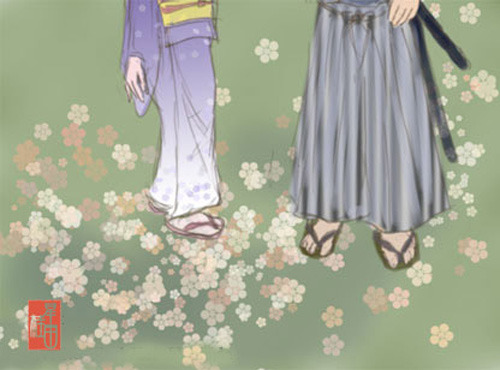
image source: WhiteWind歴史館
fushigi-dono:
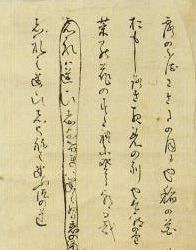
He who has fallen in love invariably falls into "mayoi" (lost in confusion or disillusion), and our lover-hero was clearly familiar with this feeling. And he who does not fall in love does not suffer from doubts and delusions, although it is not clear what he is doing in this case "on the road of love”. Maybe he just goes to fun neighborhoods
This is the only haiku in the entire collection that has the word "love" in it. And it's the only haiku circled. Hijikata Megumi explains: "Many people think that because Toshizo circled this poem, it means he was especially fond of it. But in fact, in the world of haiku poets, circling means that the poem was rejected. So he sort of crossed it out, saying, "Don't mind me, I wrote a rubbish poem. Hoshida Kei remembers how in "Moeyo Ken", Okita giggled at all the haiku except this one. And he adds: "If Toshizo had chosen love and family life, perhaps the history of the Bakumatsu would have been very different."
Next to this rejected poem is almost the same poem, in which "love" is replaced by "law"
WhiteWind歴史館:
If you know, you are lost If you don't, you won't be lost the path of love
It is funny just to imagine what kind of face "that Hijikata Toshizo" must have had when he wrote these haiku.
In Shiba Ryotaro's novel "Moeyo Ken", there is a scene in which Okita Souji comes across Toshizo composing a haiku as "Hogyoku", and he is scornful and appalled. This may be one of those scenes where even if you are not Okita, you would have a hard time commenting, "Oh dear..." (laughs).
Perhaps Toshizo himself thought, "I really shouldn't have done this," and composed another non-love haiku next to this one, using similar words. This phrase, which he wrote on a piece of paper, was not scribbled out; rather, it was deliberately circled.
Apparently, this is called "mise-gechi," which means to erase the part to be deleted so that it is visible, but to us, it looks as if he is insisting, "This part is important!”
Both before and after the formation of the Shinsengumi, Toshizo was a "man of love”. There must have been a time when he was unsure about his decision on the most important event in his life. If Toshizo had chosen love, the history of the Bakumatsu might have looked very different.
#poem#quote#hijikata quote#Hijikata#translated#translated from Japanese#fushigidono#series: hijikata haiku#hijikata poem
46 notes
·
View notes
Quote
Go to the fields of Musashi, and get drunk admiring cherry blossoms
Hijikata Toshizo
Original: 武蔵野やつよふ出て来る花見酒
Read all of Hijikata’s haiku poems here: https://shinsengumi-archives.tumblr.com/post/683071924948058112/hijikata-toshizos-haiku-poems
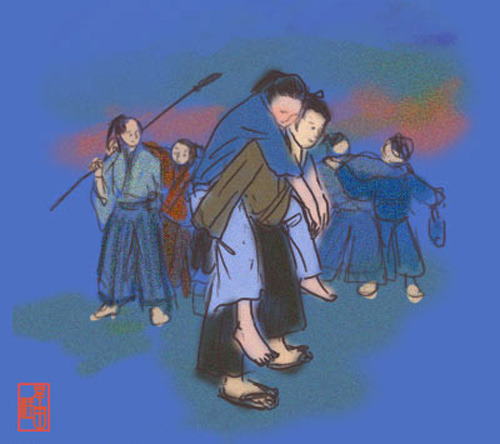
image source: WhiteWind歴史館
fushigi-dono:
The second haiku on the theme of "there's no excuse not to drink!” Judging by the fact that the occasion is still the same, it seems that admiring the cherry trees in the company of friends of the future Vice-Commander has always been marked by stormy libations :)
I don't really understand what "tsuyou idekuru" means here. In modern parlance, it usually means "to manifest strongly". Did the sake go to your head, or what? Judging by the picture and Hoshida Kei's comment, that's what it means: he accidentally drank too much, so he can't walk by himself, and she also thinks Gen-san is carrying him because he lives nearby, but I'm not so sure about that either.
There's also "tsuyoku deru" which means to be strong and resolute, and "sake-ni tsuyo" which means to be able to drink a lot without getting drunk. So perhaps what is meant is "to go and get drunk with determination”. And I'm also subconsciously reminded of our Russian "Good going!" Could this be it? Hmm...
It's not so simple with "Musasino" either. It can have three meanings: 1) Musashi is the native province of Hijikata, which included Edo, Tama, and Hino, in general all the surrounding area; "no" means field, plain. 2) Musashino is the name of a town between Edo and Hino. 3) Musashino - large cups for sake. Like, as bottomless and vast as Musashi's fields. Hoshida Kei has this in her dictionary, but she didn't find it out right away, so she added it later.
I found these Musashino cups on the internet. They have a capacity of 180 grams. Here, you can estimate the size:
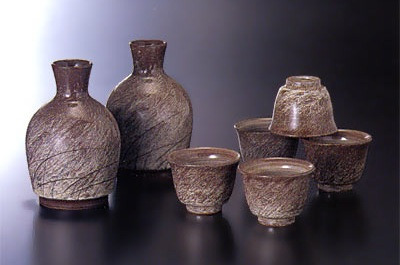
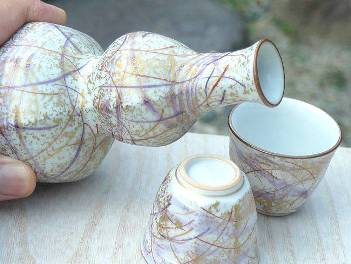
So when movies show the Shinsengumi drinking sake from tiny traditional cups, don't believe it! At least in my homeland, when I was young, we used to drink with larger cups. Although, of course, maybe Hijikata was just referring to the fields.
WhiteWind歴史館:
Musashino You're going to get drunk hard. Hanami sake
He got drunk on hanami (cherry blossom viewing) sake.
He may have drunk more than he was allowed to drink at Hanami with his friends, and by the time they were ready to go home, they were "on their last legs". I imagine him being carried on his back by someone like "Gen-san”.
Perhaps Toshizo was not a strong drinker by nature. In his collection of haiku poems, only two poems, this one and the aforementioned "I am on the hill," are clearly composed with sake as the theme.
A few years after enjoying the cherry blossom viewing, the members of the Shieikan became well known in the history of the Bakumatsu, but they were just ordinary young people who were a little bit out of place on a calm spring day, not so different from today's youth.
“Musashino" also means "big cup. Musashino was a field as far as the eye could see, so the word "Musashino" means "field of vision," in other words, "drink up" (laughs). The Edo period was a treasure house for these kinds of old man's gags. I wonder if Toshizo drank a large cup of sake in one gulp...
#poem#quote#hijikata quote#Hijikata#translated#translated from Japanese#fushigidono#series: hijikata haiku#hijikata poem
22 notes
·
View notes
Quote
It’s cold sleeping in this shabby house, the spring moon shines above
Hijikata Toshizo
Original: あはら屋に寝て居てさむし春の月
Read all of Hijikata’s haiku poems here: https://shinsengumi-archives.tumblr.com/post/683071924948058112/hijikata-toshizos-haiku-poems
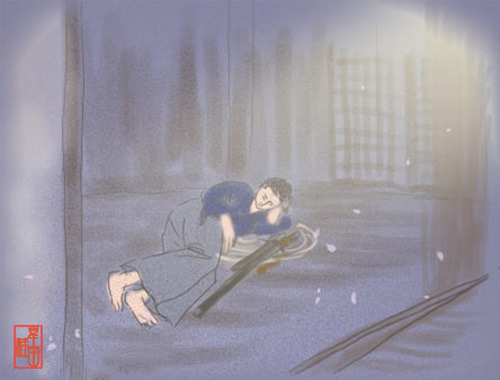
image source: WhiteWind歴史館
fushigi-dono:
This haiku was also mocked in Peacemaker. The moon won't let Hijikata sleep anywhere, but in a shack.
Although it could be that he, of course, was speaking modestly about his home, but somehow it doesn’t seem right to call a five-room house with two kitchens a “shack”. So most likely he got lost somewhere along the road, where it’s cold to sleep at night, not like at home .
There's a very good analysis of this "haiku about cold feet" right here, so I won't repeat it :)
WhiteWind歴史館:
He dozed off in an "abaraya" (small resting place comprising of four pillars and a roof (with no walls)) and woke up feeling cold and the moon was shining.
Toshizo's family were wealthy farmers who were considered "Odaijin" (low-ranking official who works for the nobility), and his house was far from being an "abaraya," so I was tempted to pry into his life to find out in which "abaraya" he had slept in.
I think it might have been where he was practicing the Tennen Rishin-ryu, but the setting of the house, with a spring moon hanging outside, made it seem like a "nap" that had a deeper meaning.
I wonder if he caught a cold or something. This poem leaves us wondering about many things.
#poem#quote#hijikata quote#Hijikata#translated#translated from Japanese#fushigidono#series: hijikata haiku#hijikata poem
14 notes
·
View notes
Quote
Steam from my morning tea, here and there, merges with the haze of dawn
Hijikata Toshizo
Original: 朝茶呑てそちこちすれば霞けり
Read all of Hijikata’s haiku poems here: https://shinsengumi-archives.tumblr.com/post/683071924948058112/hijikata-toshizos-haiku-poems

image source: WhiteWind歴史館
fushigi-dono:
The Hijikata family grew green tea in their garden. It must have been delicious...
The illustration on Hoshida Kei's website depicts training in Shieikan on an early spring morning. People used to rise at dawn when there was still fog, then sit down for breakfast and tea, with the dawn haze clearing after everyone had gone about their business. Hoshida Kei writes in a commentary that modern Japanese usually get up later and hardly ever see the morning fog. Well, for many of us, it's a familiar sight :)
WhiteWind歴史館:
I had my morning tea. I was doing this and that It’s getting misty.
People used to be early risers.
They would get up before dawn and get a lot of work done before breakfast. Then they had breakfast, drank tea, and sighed in relief.
After that, while they were doing whatever it was they were doing, the morning haze finally started to dissipate. It was the beginning of a spring day, and he felt as if he might doze off if he sat in the sun.
In the days when there was no electricity, no gas, no running water, and everything had to be done by hand, time must have been used carefully.
Today, when the morning haze cleared up, we might just be starting to get up, rubbing our sleepy eyes...
#poem#quote#hijikata quote#Hijikata#translated#translated from Japanese#fushigidono#series: hijikata haiku#hijikata poem
12 notes
·
View notes
Quote
Every time the cherry blossoms bloom, I grow a year older
Hijikata Toshizo
Original: 我年も花に咲れて尚古し
Read all of Hijikata’s haiku poems here: https://shinsengumi-archives.tumblr.com/post/683071924948058112/hijikata-toshizos-haiku-poems
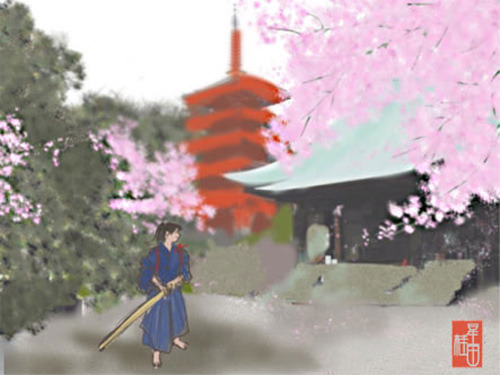
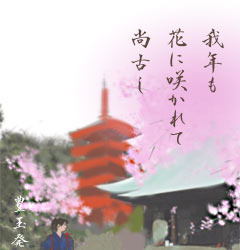
image source: WhiteWind歴史館
fushigi-dono:
In ancient times, for many Japanese, the word "hana" (flower) meant plum blossoms. Now (and probably in the Bakumatsu era as well) it means cherry blossoms. The sakura blossoms follow the plum blossom, usually in March. In the old lunar calendar, the third month in Japan was called "sakurazuki," that is, "cherry blossom month. It is believed that the sakura represents beauty and flawlessness due to the short duration of its blossoming - it lasts only a few days, and sometimes only a few hours. In popular tradition, this circumstance is associated with the transience of youth and the fleetingness of life, which is reflected in this haiku.
Generally speaking, everyone’s birthday in Japan was celebrated at the same time as the New Year. On the first day of the New Year it was believed that everyone became a year older, and they congratulated each other on it. And the age was counted from the New Year, not from birth. But another year is added to your age in January, in March you already have the feeling that time is running out, the cherry blossoms have already left...
Hoshida Kei also explains: "Wa ga toshi" gives a reference to such a concept as "toshi otoko" (年男) - a person born under the current year’s zodiac sign. The signs of the Oriental zodiac are repeated every 12 years, so this haiku was most likely written in March 1859, the year of the Goat. Hijikata Toshizo was then 25 years old according to the Japanese calendar. You're that age when you start to think, "Gee, the years are passing, and I haven't done anything good yet!”
WhiteWind歴史館:
My age, By the time the cherry blossoms bloom, I’m getting old.
During the New Year's holiday, during the three days of Matsunouchi, each day is as fresh as the first day of the year. The use of the year's name with an incremented number is still very new, and in January, everything around us is called "Hatsu-nan-na-ka," which means "first time" in Japanese.
However, we soon become accustomed to the new year, and the month of February flies by, and before we know it, March is about to end. Before we know it, the cherry blossoms have bloomed without any notice, and he felt as if "this year" has already been used up...or so I think.
I guess "my year" means the year of the twelve signs of the Chinese zodiac, i.e., he’s a "toshi otoko”. If so, this haiku was written when Toshizo was 24 years old.
The haiku seems to express a faint melancholy over the fact that the time has passed while he was worrying about various things.
#poem#quote#hijikata quote#Hijikata#translated#translated from Japanese#fushigidono#series: hijikata haiku#hijikata poem
13 notes
·
View notes
Quote
In the pine garden, my precious snow has already melted
Hijikata Toshizo
Original: 大切な雪は解けけり松の庭
Read all of Hijikata’s haiku poems here: https://shinsengumi-archives.tumblr.com/post/683071924948058112/hijikata-toshizos-haiku-poems

image source: WhiteWind歴史館
fushigi-dono:
If Toshizo had written the word "taisetsuna" in hiragana, and then it would have had a double meaning. But he preferred to emphasize the meaning of "important, valuable”. He really liked snow! And for once it had fallen a lot, but it had already all melted, even in the shade under the pines, what a pity.
Hoshida Kay writes that this is how children usually enjoy the snow, and every day they run around the garden to see if it's melted or not. He's not a child, but a future heartless Demon Vice-Commander, acting like a child. He was a demon in some ways, but his perception of his surroundings was still so childlike and unclouded. I wonder how long... I'm beginning to think that one of Admiral Enomoto's powerful arguments when he suggested that Hijikata go to Hokkaido was, "There's a lot of snow there!" :)
WhiteWind歴史館:
The precious snow. has melted away. Pine garden
This is another one of Toshizo's favorite snowy poems.
He’s sorry to see the snow that has piled up in his garden, which is a rare occurrence, gradually disappearing.
It reminds me of the time when I was a child and saw a lump of snow still melting in the shade in the corner of the garden, and for some reason I wanted to cheer him up. I was so emotionally attached to it that the first thing I did when I got home was to go check on it.
I feel the same way about the "precious snow" as described by Toshizo.
I think that from the time when one stops being happy about snowfall, one can no longer be called a child. In that sense, Toshizo must have always been boyish on the inside.
He must have decided that a piece of snow that was still trying to melt was "his precious snow", and he must have stared at it every day.
In later years, he was called a cool-headed and cold-hearted Vice-Commander, but as a human being, his sensibility was still pure and boyish.
#poem#quote#hijikata quote#Hijikata#translated#translated from Japanese#fushigidono#series: hijikata haiku#hijikata poem
8 notes
·
View notes
Quote
North of the waters, south of the mountains, is the spring moon
Hijikata Toshizo
Original: 水の北山の南や春の月
Read all of Hijikata’s haiku poems here: https://shinsengumi-archives.tumblr.com/post/683071924948058112/hijikata-toshizos-haiku-poems

image source: WhiteWind歴史館
fushigi-dono:
I wrote about this verse once before. Wikipedia calls it a "dedication to Yamanami”. It's a kind of friendly pun based on a well-known haiku by the famous poet Yosa Buson:
菜の花や 月は東に 日は西に nanohana ya tsuki wa higashi ni hi wa nishi ni
The canola flowers... the moon in the east, the sun in the west.
Hijikata replaced "east and west" with "north and south," and "moon and sun" with "water and mountains," and rearranged the construction of the haiku itself. All this was done to unobtrusively insert "yama no minami" (山の南 ), which reminds me very much of the last name Yamanami (山南 ). Of course, maybe it's just a coincidence, and Hijikata was just describing a beautiful landscape. Especially since the Tama region really has water to the north (the Tamagawa River) and mountains to the southwest (including Mount Fuji somewhere in the distance). But all the more interesting is this play on Yamanami’s last name
WhiteWind歴史館:
North of the water, south of the mountains. Spring moon.
This haiku reminds me of Buson Yosa's famous phrase, "Canola flowers, the moon in the east, the sun in the west.
It seems as if Toshizo replaced "east and west" with "north and south" and composed only about the moon.
Also, since the phrase "south of the mountain" is used in this haiku, one can imagine that he may have been composing about Yamanami Keisuke. Even if this were the case, there is no deep meaning hidden in it. It may have been just a pun like, "North of the water, south of the mountain, oh, come to think of it, your name is also south of the mountain”.
I will just let the scenery come to my mind as the words suggest. The moon in the hazy spring night, which casted its light on Toshizo, formed a panorama of the mountains and water that gave birth to him and nurtured him, spread silently in a moment that seemed like eternity.
#poem#quote#hijikata quote#Hijikata#translated#translated from Japanese#fushigidono#series: hijikata haiku#hijikata poem
8 notes
·
View notes
Quote
A bush warbler sings, I look up from my cleaning
Hijikata Toshizo
Original: うぐいすやはたきの音もついやめる
Read all of Hijikata’s haiku poems here: https://shinsengumi-archives.tumblr.com/post/683071924948058112/hijikata-toshizos-haiku-poems


image source: WhiteWind歴史館
fushigi-dono:
Good boy, he cleaned his house :) Or maybe not at home, but at the dojo. Or maybe it was not him, but somebody nearby, and Toshizo was just observing. The nightingale started to sing, and then the dusting stopped. But in general, in haiku you usually write about yourself, so it's most likely that Hijikata-san was doing spring cleaning, and was listening...
That's how I translated it: The nightingale sang And the rustle of the broomstick Involuntarily fell silent...
Despite the vague translation in the dictionary, according to google pictures, a "hataki" is a broom for dusting. It can be made of feathers, old rags and scribbled paper (the latter version appeared in an episode of a Taiga drama, which turned out to be a secret message).

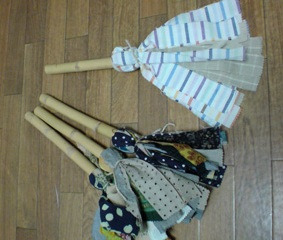
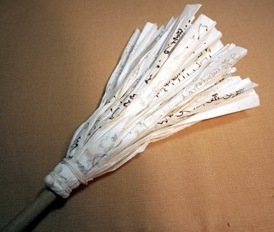
The first songs of a bush warbler are heard in Japan during plum blossom season, so this is another sign of spring. The warbler on a plum tree is a constant image that has been used in both poems and paintings from ancient times to the present day:
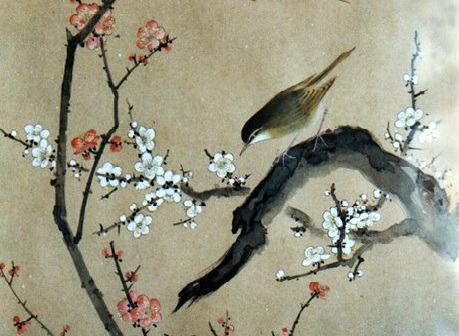

But as it turns out, both in Japan and here on the Internet, the warbler is often confused with another bird, the mejiro (literally "white-eyed" in Japanese). It is brighter, olive colored, with a white spot around the eyes, and also flies to plum blossoms. See http://japanblog.su/post97789561/, for example, the grayish birds are warblers and the greenish ones with a spot are mejiro. They are much easier to see, and while the nightingale sings, these white-eyed birds hop around on branches, which may be why there’s confusion.
They don't always chirp so vigorously, sometimes they chirp a little bit less, and a little more cheerfully. It’s a very kawaii bird, too.
Hoshida Kei, given Hijikata's interest in kites, slightly reworked this poem: Unari tako. Hataki no oto mo Tsui yameru (The roar of the kite... and the broom rustle involuntarily hushed). As long as it's not sweeping :-D
In general, this haiku has been made fun of in many places, for example in the 30th episode of the Taiga drama. But the translation in Russian is wrong, and the correct one is here: www.diary.ru/~AGEHAchou/p9301471.htm
WhiteWind歴史館:
I see a Japanese bush warbler is singing. I couldn't help but stop dusting
Hijikata Toshizo, Vice-Commander of the Shinsengumi, was a haiku poet who wrote haiku under the pseudonym "Hogyoku”.
Most of his haiku were so "poor" that even Okita Souji laughed at them in the novel "Moeyo Ken”.
However, Toshizo's haiku are very "graceful," an impression that can also be said about his life. In addition, many of his works are humorous in a way that one would not expect from his image as a "Demon Vice-Commander," so they are enjoyable to read.
Among them, I feel the most affinity with this poem (laugh).
I wonder if he was in charge of cleaning the dojo, which was like a men's club. As he was dusting, a bush warbler's song came out of nowhere, and he stopped to listen to it.
#poem#quote#hijikata quote#Hijikata#translated#translated from Japanese#fushigidono#series: hijikata haiku#hijikata poem
8 notes
·
View notes